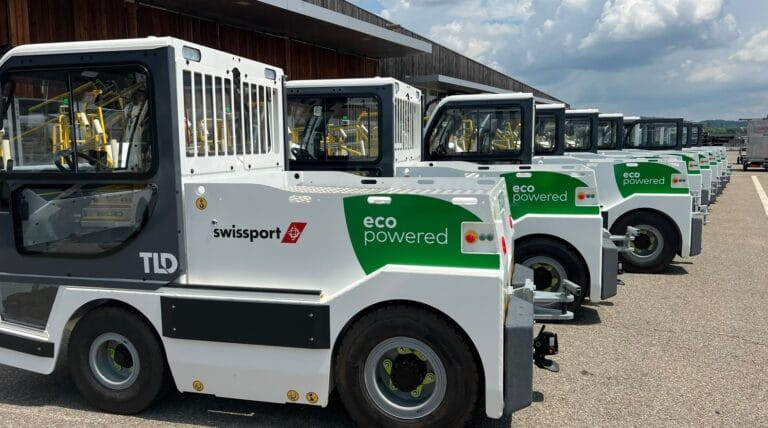Swissport is driving the industry’s green transition by investing over €1.5 billion in eco-friendly technology, including new electric ground support equipment (GSE) and renewable energy over five years. As part of its ongoing fleet renewal strategy, Swissport has purchased more than 1,000 new hybrid and electric GSEs over the past 18 months which are being deployed across 28 countries.
Over the next five years, the company is planning to invest over €1.5 billion to double down on its efforts to achieve its ambitious target of 55 percent electric GSE by 2032. “We are delivering on our sustainability commitments with concrete actions,” says Warwick Brady, President & CEO of Swissport International.
“This investment in eco-tech is a decisive step and reflects our industry-leading position on sustainability and innovation. Over the next five years, we will be building the world’s largest electric GSE fleet. Our strong commitment to clean energy also supports our airline customers’ climate goals by helping to reduce global supply chain emissions.”
Swissport operates the largest GSE fleet in the world, with approximately 14,500 motorised units, and it is the largest purchaser of new electric equipment. With this scale, the company is uniquely positioned to drive meaningful change in airport operations.
The current rollout raises Swissport’s share of electric GSE to 25.0% globally, with strong progress in key European hubs and a clear roadmap for continued acceleration. Switzerland stands out as a showcase of progress: all three Swiss airports—Zurich (43 percent), Basel (51.4 percent), and Geneva (59.4 percent)—are on track to reach the 55 percent electrification benchmark by the end of 2025. At Amsterdam Airport Schiphol, all support vehicles have been fully electric since February 2025. In the UK, Swissport has doubled its eGSE footprint over the past two years across all four major London airports— Heathrow, Gatwick, Stansted, and Luton.
The newly deployed units—ranging from electric baggage tractors and belt loaders to passenger steps and pushback tractors —are being introduced in collaboration with top-tier manufacturers under long-term agreements. These partnerships ensure sustained equipment availability, consistent quality, and optimal operational performance. Swissport is also working closely with airport authorities to facilitate the rollout of supporting infrastructure, including charging stations and power supply optimisation.
The transition to electric not only reduces carbon and particulate emissions but also enhances operational efficiency and reliability, delivering multiple benefits to airlines, airports, and employees. These include quieter, more comfortable vehicles, lower maintenance costs that boost equipment availability, increased automation potential, and enhanced safety through advanced features such as anti-collision systems. As Swissport expands its electrification program across all regions, the company remains committed to close collaboration with airport partners, regulators, and manufacturers. With a clear investment roadmap and ambitious targets, Swissport is setting new standards for efficiency, safety, and environmental performance, helping shape a more sustainable future for aviation ground operations.




